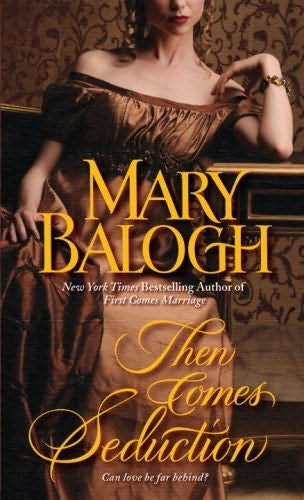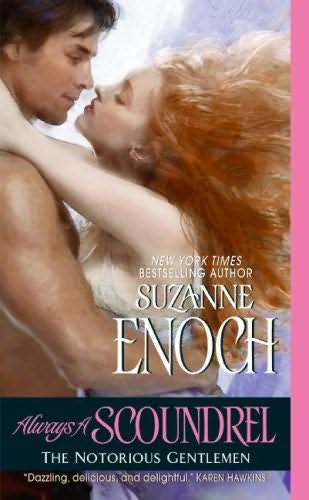
Turns out, this review is a bit like the last one, given that I'm reviewing the third book in a series. This time it's Mary Balogh's Huxtable series. (I think there are going to be two more.) The series is about a family of siblings, the Huxtables, who grew up modestly as the children of a clergyman. Margaret is the oldest, then Vanessa, then Katherine, then the only son, Stephen. In the first book,
First Comes Marriage they are living in a small village, all under the same roof except Vanessa, who married a local man and was widowed a year later. She lives with her in-laws until a nobleman shows up in the village one day and announces that Stephen, at seventeen, is now an earl due to the death of some distant relatives.
I can't exactly remember why the nobleman (I'm going to call him Elliott, because that's his name) decides that he's going to marry one of the Huxtable sisters, but he does. And he settles on Margaret, who is the oldest and also very beautiful. But Margaret has been in love with her childhood sweetheart for years, and he's been away at war for four years. Vanessa knows that her sister is waiting on her long-lost love, so she intervenes and offers herself to Elliott.

The rest of the book deals with their relationship, and I liked it, but that's probably because I like all Mary Balogh books. Vanessa has some issues she needs to deal with due to the fact that she's the ugly duckling among her beautiful siblings. And I can't remember Elliott's issues, but I seem to remember that he said some, too. I liked this book.
Then Comes Seduction is Katherine's story. It starts when she unfortunately becomes the object of a bet by Jasper, a young, rakish baron. He bets that he can get her to surrender her virginity in a fortnight, and he almost succeeds. But at the last minute he has an attack of conscience, and steps away.
Three years later, they encounter each other again, and because the bet was made publicly in a gambling house, the men of society know about their past. A scandal threatens, and Katherine reluctantly agrees to marry him.
I liked this book, too. Balogh's books are hard to describe because they focus so much on the relationship between the hero and heroine. There's usually not a whole else going on externally. I seem to remember, however, that Jasper had a motivation for entering the marriage, as well. He has a younger half-sister, and he shares guardianship with her cousin, who wants nothing more than to have full-guardianship (and access to her fortune). A respectable wife would help Jasper's cause in that area.

I think it is at the end of
First Comes Marriage that Margaret finds out that the man she's been waiting for, Crispin Dew, married a Spanish lady when he was away at war. Naturally she's very hurt and feels betrayed. She's thirty when she encounters Crispin for the first time, and because he has wounded her pride, she lies and tells him that she's engaged. She actually expects to get engaged soon, because she has a male friend who has proposed many times but that she has always turned down. But lately she had been thinking that she wants to accept and start her own family, instead of just being aunt to her sister's children.
Unfortunately for Margaret, the night she plans on accepting him is the night her friend announces his engagement to someone else. So Margaret finds herself at a ball with Crispin and no fiance. Lucky for her, when she flees the ballroom she runs into a man who conveniently agrees to be her fiance. As it turns out, he's been a social outcast for the past five years due to the fact that he left his bride at the altar and ran away with her married sister-in-law.
Like I said, Balogh's books are all about the relationships, so there's not much more to say other than I liked this book, but I didn't love it.
 Good news! Blue Smoke and Murder is classic Lowell and not the disappointing piles of poop The Wrong Hostage and Innocent as Sin were. This book is more on the scale of Always Time to Die (which I enjoyed).
Good news! Blue Smoke and Murder is classic Lowell and not the disappointing piles of poop The Wrong Hostage and Innocent as Sin were. This book is more on the scale of Always Time to Die (which I enjoyed).





